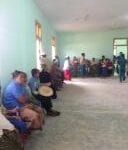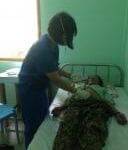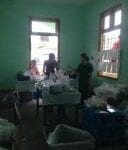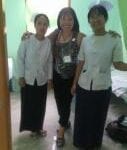Written by Thu Tran, MD,FACOG
April 23, 2014
We arrived at the Ho-Pone clinic on a very hot sunny day. The roads leading to the clinic were narrow and the clinic was located at the crossing of three roads. The driver had to park quite far from the entrance. From a distance, we could see hundreds of villagers lining up near the entrance. There was a large group of women wearing their traditional outfits ready to greet us. We have been so well received everywhere we have visited in Myanmar. The Burmese are, as I told one of the physicians, the most appreciative and the sweetest patients I have met.
“They are.” She replied happily “they are very simple people.”
Being simple people? There is nothing wrong with that; it would be a compliment to me if someone considered me simple, as Dr. Robert Smith, a former headmaster at my son’s Quaker school has written:
“Without simplicity of spirit we are not prepared to receive the truth.”
As in the first two days, I saw quite a few cases that truly “shook” me up, with one making me run to the pharmacy section to take a deep breath, wipe my eyes and be composed. It’s never a good sign for a physician to break down in front of her patients. Empathy has its limits!
I must have worried the three young pharmacists as they saw my wet eyes. They immediately surrounded and hugged me.
“Would you want to have a piece of mango or some grapefruit?” Christine the pharmacist asked me. She was fussing over me like a little sister.
“How about a cup of coconut juice? It’s very good!”
I almost laughed as I tried to wipe my eyes quickly. A cup of coconut juice would have been good. The patient probably was wondering why I dashed out of the room. I had to go back to see her and complete my work with her as there were still many more patients for me to see.
She was a lovely 15 year-old girl, tall and too thin for her height. Her BMI probably was less than 17! Her age made me think immediately of my son, a 16 year-old living the life of privilege.
She complained of not feeling well and that her menstrual cycle came only “once in a while.” Her neck looked and felt as if there was a mass on the right side below the chin, too far up to be her thyroid gland. She looked as if she had no more energy. She looked lost. I immediately listened to her heart and checked her pulse, which was in the upper 120’s (beats per minute). Her eyes were wide open and I thought they looked a bit exophthalmic. I asked her to follow me to the triage area where Dr. Dominic Legault was working and I asked him to take a look at her neck. Dominique reassured me that there was no mass; she was just so thin that everything had become more prominent. He agreed she needed a thyroid evaluation for her tachycardia (rapid heart rate) and the look of her eyes. However, thyroid stimulating hormone (TSH) is not a test available at this clinic so this girl will need to go to a lab more than an hour away to have the blood work performed. Dominique and I wondered about anemia as this could be causing her tachycardia, so I decided to give her some vitamins and urged the translator to find the chief doctor of the clinic to arrange for her to have a blood count and TSH level checked. What if they will not follow my advice? How much longer does she have to live with her lethargy?
Another indigenous woman entered the room. She looked as if she was in her late 60‘s. She was wearing a white top and longyi , with her hair pulled back in a pig tail. I asked for her chief complaint, thinking she must have had some menopausal problems.
“She just found out she’s pregnant and wants you to exam her.”
She was only 45, not in her 60s as I had thought. She must have been around 26 weeks pregnant. She was, like those before her, shocked as she heard her baby heart, her sixth baby. She had no formal record, as she just found out about her pregnancy. I didn’t have time to ask how many of her children were still alive. It seemed as if everyone in this clinic had children who had died at a young age.
This morning, I taught the medical officer how to record the patients’ obstetrics history on a standardized form. “Gravida”, I told the medical officer, means how many times a woman gets pregnant while “Para” means how many of the pregnancies were full term. The last item I wanted her to record was how many children are still “living” or “L” as an abbreviation.
One of the first patients that morning had “Para 8, Living 3.” I was shocked!
“What happened to the other five? Can you ask her what happened to her children?”
After an almost five minute conversation with the officer continuously shaking her head, I was told how she lost her five children to different illnesses. Would I have the courage to have more children if I was her? I really didn’t know the answer. How could one mourn for so many lost children?
After seeing more patients with children who died young, I stopped asking this question. Maybe I shouldn’t have reopened their wounds, as they probably could tell how the tales of their lives had saddened me as well as them.
I learned how, in Myanmar, a miscarriage is called “an abortion.” The first time I heard this term from a medical officer, I was confused.
“People have abortions here?” I was puzzled. The Myanmar people are more liberal than I thought.
“Of course, there are many abortions here. Most people are pregnant many times, so we see many abortions.” She looked at me as if I had two heads.
“But most of you are Buddhists, and I thought Buddhists do not believe in abortion.”
“Buddhists have abortion too. It can happen to anybody!” She now looked totally confused.
I bursted out laughing and told her how, In the U.S., “abortion” means termination of a pregnancy by choice. She looked as shocked as I was a few minutes ago.
“What? Finish a pregnancy by choice? Why? It is illegal to do that here.”
Mid-afternoon, a poorly dressed little girl about ten years old was helped by her parents into the room. She couldn’t walk by herself. She looked as if she was in a daze. Was she mentally challenged, I asked myself. Did she have polio? Multiple sclerosis? What was going on? I was scared.
“She shouldn’t have been here. I’m not a pediatrician.” I gently told the medical officer.
“She’s not a child, she’s in her 20s!” The officer reassured me. In her twenties? She looked like a child.
I was told how she had delivered a child a year ago, followed by a fever in the hospital and ever since, she had been terribly sick on and off and couldn’t walk whenever she got sick.
“Please take her to the neurologist of our team. She has something that I cannot diagnose and she needs help.” I was desperate. What happened in that hospital after she delivered her baby?
The young woman was quickly taken to another area in the clinic where the medical team was located. Later on, the neurologist told me how her condition was called “Malaria Cerebritis,” or inflammation of the brain from malaria infection. She must have contracted malaria shortly after giving birth and “luckily” survived her condition. Most people with this condition die. Luck as you know, is a relative term.
Towards the end of the day, Doanh, the infectious disease specialist of our group, and I had to work as a team, seeing two patients at the same time. She would interview one while I examined the other. The patients didn’t mind at all. They giggled at each other. There was no privacy, but at least they got to see the doctors before the clinic closed. All was well except for a woman in her forties with a 4 cm abdominal mass and a palpable 3-4 cm right pelvic soft mass. We advised her to have a sonogram to evaluate these masses, since neither Doanh nor I believed the abdominal mass was a lipoma, a benign tumor. It was a deeper and more solid mass. The clinic was closed so I couldn’t send her to our GI specialist Dr. Frank Procaccino.
I had a great day. The patients kept bowing and thanking me, not knowing how in reality, the privilege was mine. I practiced some “jungle” medicine, as I called it. I told a patient to break some oral estrogen pills into half and insert them in her vagina a few days a week for vaginal dryness. I forgot to bring some samples of estrogen vaginal cream from the office. The officer didn’t know if the town pharmacy had any estrogen products, and couldn’t be sure if this indigenous patient would ever be back to the clinic. I didn’t know if this oral estrogen treatment would work in the vagina. Maybe this was the beginning of a clinical trial on vaginal dryness treatment in Myanmar. I hoped it would work for this patient, for however many weeks the sample pills would last.
I also gave each pregnant woman some prenatal vitamin samples. As I still had several more clinics to go to, I wasn’t sure how many I should give them. I ended up giving each one of them about 2-3 weeks worth of vitamins, telling them to use the pills just 2-3 times weekly. This way, the sample would last for a month. One out of nine months of vitamins was better than none, I thought.
I walked away to our bus, thinking about all the patients I had met and hearing in my mind the Rolling Stones singing their famous lines:
“You can’t always get what you want,
But if you try sometimes, you just might find
You get what you need.”
Today, I hadn’t cured these patients of their illnesses but with our help, hopefully they would get the evaluations they needed and be on their way to healing.
That night, in a local restaurant with live music, we had dinner. The team leader Dr. Do, a cardiologist from northern Virginia, stayed at the hotel as he had motion sickness during the long, bumpy ride back. The Burmese singers had such beautiful voices but their songs sounded so melancolic. I was guessing they were singing love songs, as love songs never seemed to sound happy. Several mission team members came up to the stage and started singing Karaoke. We were so far away from home and they were singing to the tunes of “Country Road, Take me Home,”followed by “Hotel California.”
“Hotel California, how ironic,” I said to myself as I watched the men and women waving their hands in the air and moving their bodies with the music. Couldn’t they have chosen another song? Obviously, most of those on the stage were much younger than me. The song didn’t mean much to them but had a beautiful melody.
The first time I heard this song, I had barely arrived to the U.S. from Vietnam. I remember being “homesick” for Vietnam, as I was a “lost” teenager, a rich little girl who overnight became a refugee. Even years later, it was difficult for me to listen to this song, as it reminded me of my “childhood interrupted” and the tough first years in the U.S. when everything seemed to be upside down, where my friend was my diary. That was when I started writing so much. Where have all those years gone? Now, almost four decades later, this song made me homesick for the U.S., for Maryland, for my home now. I heard it was snowing again the other day in the Washington area, and I imagined the snow flakes touching my neck and face. I could have used some snow flakes in Myanmar, as I was about to melt in its heat.
I got to bed that night and, for the first time, slept for five hours. The following morning, I ran alone behind the hotel, past the temple and somehow got lost. I must have been so exhausted that all the streets looked the same. A nice man told me how I was only a few streets from the hotel. I got back just in time for a quick shower before we left Taunggyi for a clinic in the Nyaung Shwe area. We wil reach the beautiful Inle Lake area late tonight.
Tags:
















